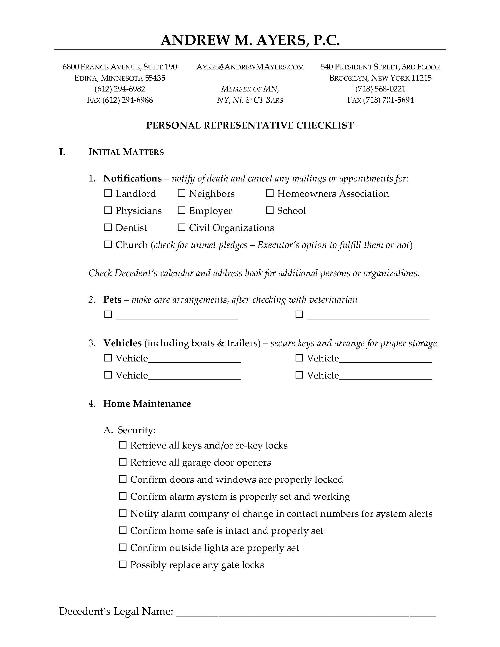 One of the primary motivations for creating an estate plan is to avoid the need for your family to deal with your local probate court. The process involved with an estate winding its way through the court system can often be frustrating and expensive for your family members. Especially if they are not comfortable dealing with paperwork or are intimidated by the courthouse, you may be leaving behind an unpleasant situation and one that may even cause fights amongst family members.
One of the primary motivations for creating an estate plan is to avoid the need for your family to deal with your local probate court. The process involved with an estate winding its way through the court system can often be frustrating and expensive for your family members. Especially if they are not comfortable dealing with paperwork or are intimidated by the courthouse, you may be leaving behind an unpleasant situation and one that may even cause fights amongst family members.
As part of the probate process, one feature may sometimes be overlooked: the filings in probate court default to being public, so your family's information will be available for anyone to review. This becomes startlingly clear when you see a celebrity pass away and their estate filings are suddenly fodder for your local news, like when Lisa Marie Presley passed away and there was a battle for her estate. Your family may eventually be able to ask a court to seal the records so they are no longer private, but that's an additional cost and time and energy that can be avoided with a proper estate plan.
Understanding Probate Court Filings
Probate is the process through which a will is validated, and an estate is administered. It involves the collection of assets, payment of debts, and distribution of the remaining assets to beneficiaries. During probate, several documents are filed with the court, including the will, inventory of assets, and various financial statements. These documents often contain detailed personal and financial information, which becomes part of the public record.
What Can The Filings Be Used For?
Last week, the wife of a client was contacted by a realtor looking to sell a property that belonged to the client's recently deceased father. This was her father-in-law, not her actual father. The wife called me up a little spooked - how did the realtor find her information? How did he know her father-in-law was dead? Why didn't he call her husband, one of his siblings, or her mother-in-law?
It gave my client's wife a real "ick" feeling when that message popped up on her phone. What it highlighted was one of the primary reasons that people create their estate plan to avoid probate court filings: Privacy. The realtor didn't do anything "illegal" but did creep out my client's wife. What likely happened:
1. Realtor saw notice of father-in-law's estate
2. Realtor found obituary or other online information about father-in-law
3. Realtor tried to be creative, rather than contacting mother-in-law or one of the children, realtor reached out to spouse of the oldest child of the father-in-law
All of this information is publicly available and it's not just creditors looking to get paid who review probate court filings. If your estate goes through probate court, there's a good chance you'll also receive some kind of outreach from people who "scrape" probate records. Some clients don't mind. Many others? They want to do all they can to avoid this scenario.
Privacy Concerns in Probate
Along with the "ick" feeling that you can get from your information being scraped from probate filings (#3 below), the main concerns that my clients have when it comes to probate court:
-
Public Access to Records: One of the primary privacy concerns in probate proceedings is that most documents filed become publicly accessible. This means that anyone can request and view these records, potentially exposing sensitive information such as the value of the estate, identities of beneficiaries, and detailed financial data.
-
Identity Theft: With personal and financial details available in public records, there is a risk of identity theft. Malicious actors can exploit this information to commit fraud or other illegal activities.
-
Unwanted Attention: Public probate records can attract unwanted attention from creditors, solicitors, and opportunists looking to exploit beneficiaries. This can lead to harassment or undue pressure on the estate's representatives.
The risk of identity theft is seemingly always rising as new technologies emerge and bad actors find new ways to access your personal information. Ironically, the probate filings have been public for years and the more savvy criminals have been taking advantage of them as best they can.
Strategies for Protecting Privacy
Luckily, with all the concerns over privacy and probate court, there are strategies you can use to keep your estate private. Here's four common strategies my clients employ:
-
Utilize Trusts: One effective strategy to maintain privacy is to use living trusts instead of wills. Trusts do not go through probate, keeping the details of the estate and its distribution private.
-
Plan Ahead: Engaging in comprehensive estate planning can help minimize the amount of information that becomes public. This includes setting up pay-on-death accounts, joint ownership of assets, and other non-probate transfers.
-
Seek Legal Advice: Consulting with an experienced estate planning attorney can help in devising strategies tailored to individual needs. Attorneys can provide guidance on how to structure an estate to enhance privacy and protect sensitive information.
-
Review and Update Plans Regularly: Estate plans should be reviewed and updated regularly to ensure that they align with current laws and personal circumstances. This proactive approach helps in addressing any potential privacy concerns promptly.
Privacy in probate court filings is a crucial issue that requires careful consideration and planning. By understanding the risks and employing effective strategies, individuals can protect sensitive information and ensure that their estate is managed according to their wishes while maintaining privacy. As laws and regulations continue to evolve, staying informed and seeking professional advice are key to safeguarding one's legacy.
Need Help with Your Estate Plan?
If you don't already have an estate plan, or if you have one that needs to be updated to avoid unnecessary probate proceedings, let's schedule a Legal Strategy Session online or by calling my Edina, Minnesota office at (612) 294-6982 or my New York City office at (646) 847-3560. My office will be happy to find a convenient time for us to have a phone call to review the best options and next steps for you to work with an estate planning attorney to get your estate plan prepared.





